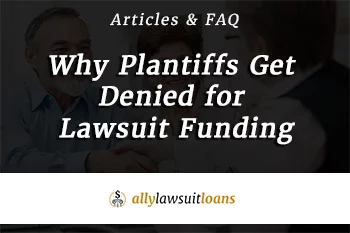
When you’re involved in a lengthy lawsuit, your cash flow may run low as your stress runs high.
While your attorneys spend months negotiating a settlement, your bank account plummets. You may worry about paying your bills and wonder where to find funding for a lawsuit.
We have a simple lawsuit funding suggestion. During this long settlement process, you can apply for a lawsuit cash advance.
You may have some questions about a settlement advance.
- What is a settlement advance?
- How do you qualify for a cash advance?
- Why would you get denied funding for a lawsuit?
Keep reading for answers to common lawsuit funding questions.
What is a Settlement Advance?
A settlement advance involves you borrowing from your future settlement award.
The simple process follows these four steps:
- You apply with a lawsuit funding lender.
- The lender talks to your attorney about the merits of your case.
- The lender informs you if you qualify for a lawsuit cash advance.
- The lender delivers your cash advance within 24 hours.
You don’t pay back your lawsuit advance until you receive your settlement award. If you don’t win your lawsuit, you owe nothing on your lawsuit cash advance.
How Do You Qualify for a Cash Advance?
Lawsuit cash advances differ from other loans.
For traditional loans, lenders qualify the borrower based on credit score and income. Instead, for lawsuit funding, lenders evaluate the borrower’s potential settlement.
Lenders gain the confidence to fund your lawsuit if they think that you are likely to win a substantial settlement.
After you apply for a settlement advance, the lender investigates your potential to win a settlement award. The lender calls your attorney to see where your case stands.
From this communication, the lender wants to learn a few things about your case:
- How likely are you to settle?
- When are you expected to settle?
- How big of a settlement should you receive?
These case factors determine whether you qualify for a lawsuit cash advance.
Why Would You Get Denied Funding for a Lawsuit?
If a lender denies you a cash advance funding for your lawsuit, you probably feel disappointed. You may wonder what factors lenders evaluated before denying you funding.
There are several reasons why a lender may decide not to fund your lawsuit cash advance.
Cash Advances Violate State Law
Most states allow lawsuit cash advances. However, there are a few states that prohibit this form of financial assistance. Currently, three states ban settlement cash advances:
- Maryland
- Colorado
- Tennessee
If you live in one of these three states, a lender cannot provide you a lawsuit cash advance. Even if you have a strong case, state law prohibits a lender from offering you an advance.
You Don’t Have an Attorney
A lender needs to speak to your attorney before offering a lawsuit cash advance.
If you don’t have an attorney, the lender cannot make an informed decision on your loan.
Even if you present a strong case, the lender needs to understand where you stand legally.
Hiring an attorney increases your settlement potential and settlement amount significantly.
A lender insists that you hire an attorney because the lender wants you to have the best chance at winning your case.
Hire an attorney to expedite your case and your potential for a settlement cash advance.
Most personal injury attorneys work on a contingency fee, meaning that you don’t have to pay your attorney up-front.
The contingency fee varies by the attorney. You should read your attorney-client contract carefully to make sure you understand contingency fee details.
A lawyer working on contingency wants your case to settle for as much as possible.
This motivation should make an attorney work even harder for you.
Consult several attorneys, and sign on with the one who seems like your best advocate.
You Have Other Funding
If you already have a cash advance, that doesn’t automatically disqualify you from obtaining a new settlement advance.
The second advance functions as a lower interest refinance on the previous settlement advance.
However, if you owe more than a lender thinks your settlement is worth, the lender won’t issue another advance.
After all, the lender needs to believe that you can pay back the advance.
Lenders don't issue a predetermined cap on cash advances because each case is unique.
Each advance depends on the settlement potential of the associated lawsuit.
If your previous advance balance falls below your potential settlement, a new lender could offer you another cash advance.
Get Pre-Settlement Funding Now
Even if a lender has denied your settlement advance before, we will give it a second look.
Some of the factors that disqualified you previously may have changed.
If you need cash while you wait for your lawsuit settlement, call us at (800) 760-0704 or apply today!


